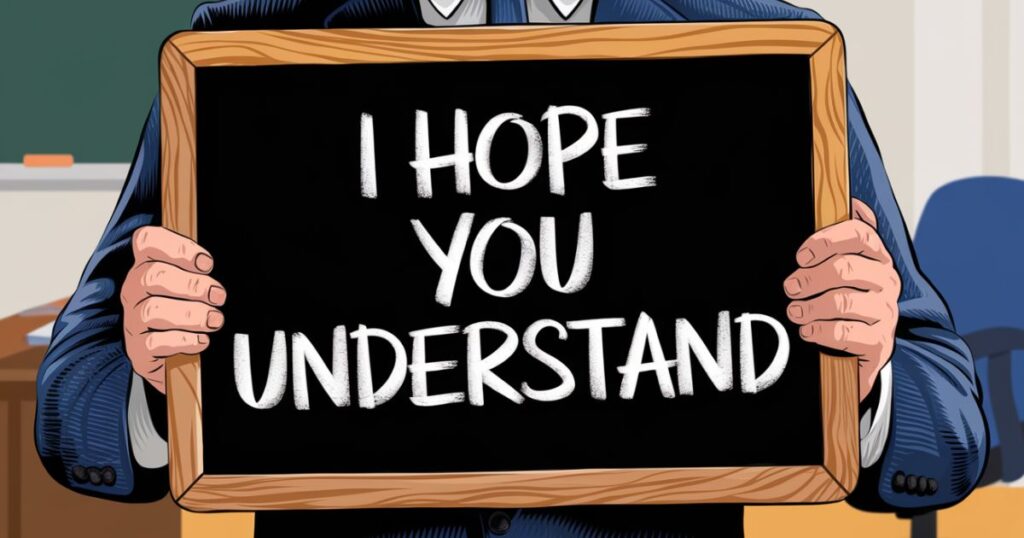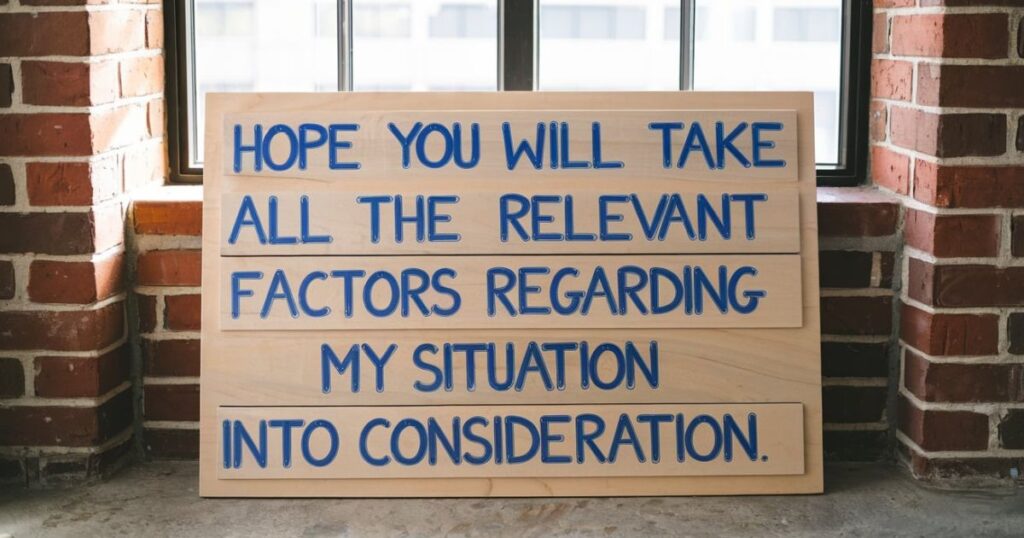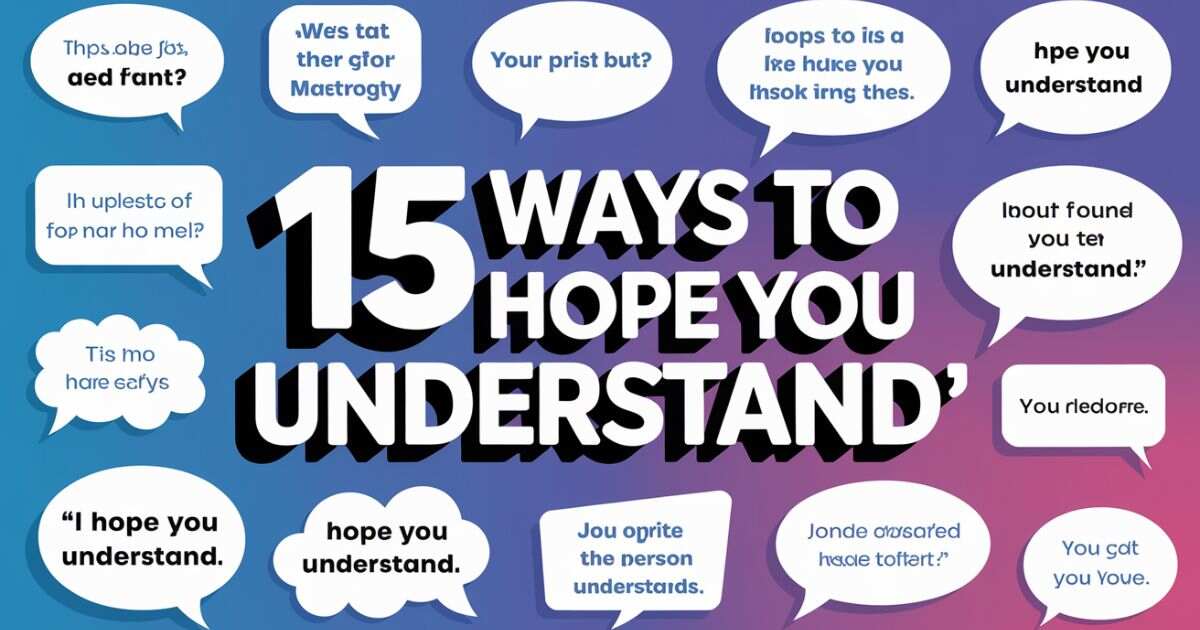In our daily interactions, we often find ourselves in situations where we need to express our desire for understanding. Whether it’s explaining a complex concept, justifying a decision, or seeking empathy, the phrase “I hope you understand” is a go-to for many. But let’s face it – relying on this one expression can make our communication feel stale and repetitive. That’s why we’ve compiled this comprehensive guide to help you diversify your language and connect more effectively with your audience. 15 Ways To Say “I Hope You Understand”.
Alternative Ways to Say “I Hope You Understand”

Before we dive into the specifics, let’s consider why varying our language matters. Using different expressions not only makes our speech more engaging but also demonstrates a nuanced grasp of the English language. It shows that we’re putting thought into our words, which can make our listeners more receptive to our message.
Here’s a quick reference table of alternatives to get us started:
| Formal | Informal | Empathetic |
|---|---|---|
| I trust you understand | I hope you get it | I’m hopeful that you can understand |
| Your understanding is appreciated | I’m sure you get the point | I hope you can appreciate my position |
| I would ask for your understanding | Hope that makes sense | I hope you can grasp what I’m saying |
Now, let’s explore each alternative in depth.
I Hope for Your Understanding in This Matter
This phrase is slightly more formal than the original and can be particularly useful in professional settings. It conveys a sense of respect for the listener while still expressing your desire for comprehension.
Example: “I’ve decided to postpone the project launch. I hope for your understanding in this matter, as it will ultimately lead to a more polished final product.”
I Hope That Makes Sense
This casual alternative is perfect for everyday conversations. It’s a friendly way to check if your explanation has been clear without putting pressure on the listener.
Example: “So, quantum physics is like a cat in a box that’s both alive and dead at the same time… I hope that makes sense!”
I Trust You Understand
By using “trust” instead of “hope,” you’re expressing confidence in the listener’s ability to comprehend. This can be particularly effective when dealing with complex topics or sensitive issues.
Example: “Given the current market conditions, we need to tighten our budget. I trust you understand the necessity of these measures.”
Your Understanding Is Appreciated
This phrase shifts the focus from the act of understanding to your gratitude for it. It’s a subtle way to acknowledge the effort the listener is making to grasp your point.
Example: “I know this policy change might be inconvenient. Your understanding is appreciated as we work to improve our overall efficiency.”
I’m Hopeful That You Can Understand
This expression conveys optimism about the listener’s ability to comprehend, while also acknowledging that understanding might not be immediate.
Example: “The reasons behind this decision are complex, but I’m hopeful that you can understand why it’s necessary for our long-term success.”
I Hope You Get It
This informal phrase is best used among friends or in casual settings. It’s direct and to the point, perfect for when you’re explaining something quickly.
Example: “So, the offside rule in soccer is like… well, it’s complicated. I hope you get it, but don’t worry if you don’t!”
I Hope You Can Appreciate the Position I’m In
When you need to make a decision that might not be popular, this phrase can help foster empathy. It invites the listener to consider your perspective.
Example: “I had to choose between two equally qualified candidates. I hope you can appreciate the position I’m in and why this decision was so difficult.”
I’m Sure You Get the Point
This confident statement assumes understanding, which can be effective when you’ve provided a clear explanation or when dealing with familiar concepts. 15 Ways To Say “I Hope You Understand”.
Example: “After reviewing the data, it’s clear that our current strategy isn’t working. I’m sure you get the point – we need to pivot, and fast.”
I Hope You Can Grasp What I’m Saying
Similar to “I hope you get it,” this phrase is slightly more formal and can be used in professional settings when explaining complex ideas.
Example: “The new software architecture will improve our scalability tenfold. I hope you can grasp what I’m saying about its potential impact on our business.”
I’m Sure You Take My Meaning
This slightly old-fashioned phrase adds a touch of formality and can be useful in written communication or more traditional business settings. 15 Ways To Say “I Hope You Understand”.
Example: “The market is volatile, and we must act with caution. I’m sure you take my meaning when I suggest a more conservative investment strategy.”
I Hope You Can Accept This
When you need to deliver news or a decision that might be disappointing, this phrase acknowledges the potential difficulty while expressing your desire for acceptance.
Example: “Unfortunately, we won’t be able to extend your contract at this time. I hope you can accept this decision and understand that it’s based purely on budgetary constraints.”
Thank You for Understanding
This phrase assumes that understanding has already been achieved and expresses gratitude for it. It’s a positive way to conclude an explanation or request. 15 Ways To Say “I Hope You Understand”.
Example: “We’ll need to reschedule our meeting due to an unexpected conflict. Thank you for understanding, and I look forward to our discussion next week.”
I Would Ask for Your Understanding
This polite request frames understanding as a favor, which can be effective in situations where you’re asking for patience or flexibility.
Example: “As we implement the new system, there may be some temporary disruptions. I would ask for your understanding during this transition period.”
“Hope You Will Take All The Relevant Factors Regarding My Situation Into Consideration.”

This longer phrase is useful when you need to emphasize the complexity of a situation. It invites the listener to consider multiple aspects before forming an opinion. 15 Ways To Say “I Hope You Understand”.
Example: “My decision to change careers might seem sudden. I hope you will take all the relevant factors regarding my situation into consideration, including my long-term goals and recent experiences in the field.”
Your Understanding Is Much Appreciated
This expression combines gratitude with the assumption of understanding, making it a warm and positive way to conclude an explanation or request.
Example: “I’ll need to take some time off to care for a family member. Your understanding is much appreciated as I navigate this challenging time.”
Conclusion
Mastering these alternative ways to say “I hope you understand” can significantly enhance your communication skills. By choosing the right phrase for each situation, you can convey your message more effectively, build stronger relationships, and navigate complex interactions with grace and clarity.
FAQs
What is another way to say, I hope you understand.
There are many alternatives, such as “I trust you understand,” “Your understanding is appreciated,” or “I hope that makes sense.” The best choice depends on the context and your relationship with the listener.
How do you say, “We hope for your understanding”?
You could say, “We kindly request your understanding,” “We would greatly appreciate your understanding in this matter,” or “We hope you can see things from our perspective.”
What is a better way to say I understand?
Instead of simply saying “I understand,” you could use phrases like “I see where you’re coming from,” “That makes perfect sense to me,” or “I can relate to what you’re saying.”
How do I say “I understand” in a polite way?
Polite ways to express understanding include “I completely understand your position,” “I appreciate your perspective on this,” or “Thank you for helping me understand your point of view.”











